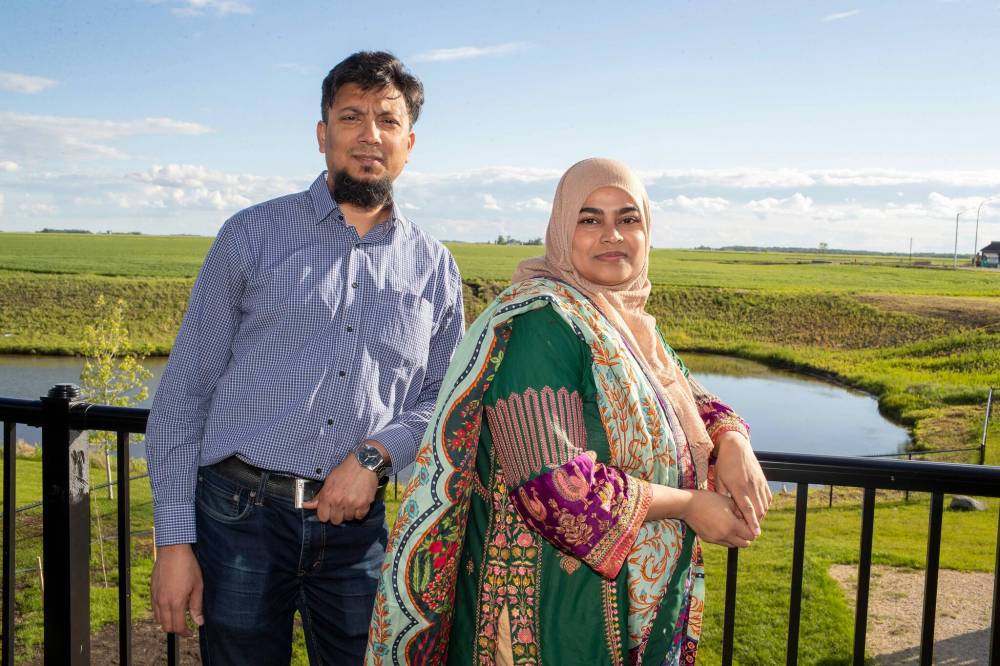TWO months ago, about 15,000 Muslims filled the convention centre to celebrate Eid al-Fitr, the religious holiday marking the end of Ramadan.
This Sunday, they will do it again for Eid al-Adha, also known as the “feast of sacrifice.” This holiday marks the end of the Hajj, the annual pilgrimage to Mecca — the holiest city in Islam — and commemorates Abraham’s obedience to God through his willingness to sacrifice his son.
“It will be a time of prayer and praising and thanking God,” said sheikh Ismael Mukhtar of the Manitoba Islamic Association.

BROOK JONES / FREE PRESS
Danish Habib (left) and his wife Urooj Danish made the pilgrimage to Mecca in 2017 and recall it as a serene experience. They say they’d do the Hajj again in a heartbeat.
Due to the large amount of people who want to attend the celebration, it will be divided into three services of 5,000 people each. Mukhtar will deliver the sermon at the middle service. In it, he will remind his listeners what it means to be faithful, talk about the importance of being kind to each other, and about the need to be generous in responding to needs in places like Gaza, Sudan and Yemen — and also in Winnipeg.
“I will tell them to have a sense of care for the whole community, about caring and sharing for all,” he said, adding that charity is “a big part” of the celebration.
One way some Manitoba Muslims express that charitable impulse is by buying a ritually pure lamb, goat or cow from a local abattoir and donating a third of the meat to organizations that can distribute it to people in need in the city.
Those who cannot arrange for such a purchase can donate money to an organization like Islamic Relief Canada, which will arrange to give meat to hungry people in the developing world.
During the celebration, Mukhtar will be recalling his journey to Mecca more than 10 years ago.
“It was an amazing and holy experience, a time of deep reflection and focusing on the creator,” he said about the pilgrimage, which is a pillar, or obligation, of the Islamic faith for Muslims who are physically and financially able to make the trip.
What also helped make it special was “meeting people from all over the world, different languages and ethnicities,” he said.
Winnipeggers Danish Habib and Urooj Danish went on the Hajj in 2017. “There was a very spiritual feeling there that’s hard to explain,” said Urooj, 39. The experience “was serene, peaceful and meaningful. I was able to leave my worries behind and feel closer to God,” she said.
For her husband, Danish, 41, the only thing on his mind “was worshipping Allah, and learning what he wants from us.”
While spiritually significant, the trip, which took a total of 15 days including travel, was also physically arduous. Daytime temperatures in Saudi Arabia were over 50 degrees Celsius, accommodations were in large tents and one night was spent sleeping on the ground underneath the stars. The holy sites were crowded with more than two million pilgrims and the couple walked 10 to 15 kilometres each day to the various holy sites.
“We knew it would be hard, so we wanted to do it when we were young, healthy and strong enough to perform the rituals,” said Urooj. “It took a toll on our bodies.”
It also wasn’t inexpensive. The total cost for the couple was about $30,000, paid through a tour company that looked after airfare, accommodations, food and other arrangements.
Despite the cost and the physical hardships, the two say they’d do it again “in the blink of an eye,” said Orooj. “It was a time to reflect on my life, my relationship with God and with others.”
Tasneem Vali, 51, went on the Hajj with her husband in 2007. “I was so much in awe,” she said. “It was the culmination of my faith in God.”
Vali also found the journey physically demanding but says it helped her understand what was important in life — “not things, but relationships. It was a life-changing experience”
She said what also made it significant was knowing she was following in the footsteps of the Prophet Muhammad, who made the same pilgrimage.
In addition to the Eid al-Adah services at the convention centre, which occur at 6:30 a.m., 8:30 a.m. and 10:30 a.m., there will be a French-language service at the Centre Culturel Franco-Manitobain at 8:30 a.m.
faith@freepress.mb.ca

John Longhurst
Faith reporter
John Longhurst has been writing for Winnipeg’s faith pages since 2003. He also writes for Religion News Service in the U.S., and blogs about the media, marketing and communications at Making the News.
Our newsroom depends on a growing audience of readers to power our journalism. If you are not a paid reader, please consider becoming a subscriber.
Our newsroom depends on its audience of readers to power our journalism. Thank you for your support.